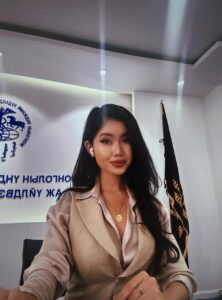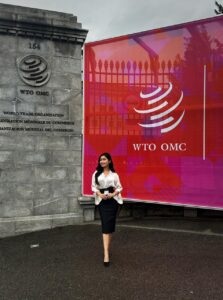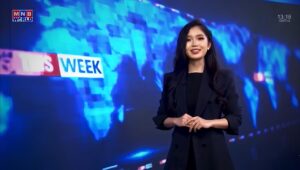What motivated you to transition from journalism to project management and entrepreneurship, and how has your background in broadcasting influenced your current roles?
My transition was driven by a desire to combine creativity with tangible impact. Journalism provided me with a strong foundation in storytelling and strategic communication—both of which are essential for engaging diverse stakeholders and effectively reporting progress in project management. As a broadcaster, I learned to distill complex ideas into concise and compelling messages, a skill that has been invaluable in business and entrepreneurship. This ability to communicate allows me to advocate effectively for causes like empowering women entrepreneurs and fostering business networks in Mongolia. Broadcasting also nurtured my confidence and adaptability, which are crucial in managing dynamic projects and building connections across diverse sectors.

As the founder of Nandin Tea, what challenges did you face when starting your own business, and how did you overcome them?
Starting Nandin Tea was both exciting and challenging. One of the biggest hurdles was creating a sustainable system that could operate independently of my constant oversight, especially as I split my time between Mongolia and Geneva. Delegating responsibilities and building a team of skilled and motivated individuals were essential steps. Learning to trust my team and establishing operational structures helped me overcome these challenges. Additionally, balancing innovation with tradition was crucial to positioning Nandin Tea as a unique premium brand rooted in Mongolian culture. By highlighting Mongolia’s rich tea heritage and focusing on high-quality products, we were able to carve out a niche in the market, attracting both local and international customers.
What are the key skills you believe are essential for effective project management, especially in the context of national and international projects?
Effective project management requires a blend of technical and interpersonal skills. Flexibility, clear communication, and stakeholder management are non-negotiable. Strong reporting is particularly critical; even the most significant achievements can lose their impact if not communicated effectively. In the context of international projects, understanding cultural and policy differences is key to ensuring alignment and success. Moreover, the ability to commit to multiple priorities while maintaining focus on long-term goals is essential. These skills have allowed me to manage several complex projects simultaneously, delivering results that align with both local and global objectives.
As the Secretary General of the Women Entrepreneurs Council, what initiatives are you most passionate about to support women in business?
I am deeply passionate about empowering women entrepreneurs through capacity building and policy advocacy. In Mongolia, women play a significant economic role, leading around 70% of MSMEs. Despite this, many women, particularly in rural areas, face barriers such as limited access to finance, digital literacy, and training. Our initiatives aim to bridge these gaps. For example, we recently partnered with ITC SheTrades to train women-led businesses in digitalization and marketing, helping them integrate modern tools into their operations. These efforts, combined with policy advocacy to promote access to funding and export readiness, are creating lasting change. By addressing these systemic barriers, we are paving the way for a stronger and more inclusive business ecosystem.
How has your experience in Mongolia shaped your perspective on international business and project management?
Mongolia’s dynamic yet challenging business environment has been a profound learning ground. It has taught me the importance of adaptability and strategic foresight. The interplay between local politics, education, and business operations underscored the need for holistic approaches to project management. While my international education equipped me with global best practices, working in Mongolia reinforced the value of localized solutions that consider cultural and economic nuances. This dual perspective has enabled me to bridge global strategies with local realities, ensuring projects are both impactful and sustainable.
What advice do you have for students on how to build a professional network in the business world, especially in a global context?
Building a professional network is about creating authentic and meaningful connections. Start by attending conferences, volunteering, and actively engaging with professionals through platforms like LinkedIn. Approach potential mentors or connections with thoughtful questions that show genuine interest in their expertise. Remember to follow up after initial meetings to maintain the relationship. As a student, take advantage of your unique position—most professionals are happy to guide and mentor students who demonstrate initiative. Networking isn’t just about quantity; focus on building quality connections that align with your goals.
 How do you manage your time effectively for your professional commitments?
How do you manage your time effectively for your professional commitments?
Balancing multiple roles requires a disciplined approach and a structured system. I allocate specific days to dedicated tasks, such as recording news segments or managing projects at MNCCI. Prioritization is key, and I ensure that my schedule reflects both urgent and long-term goals. I’ve also cultivated a mindset of lifelong learning, viewing every new challenge as an opportunity for growth. This perspective keeps me motivated and allows me to stay productive even when managing diverse responsibilities.
How has your experience as a journalist enhanced your skills in communication and storytelling, and how do you apply these skills in your current roles?
Journalism honed my ability to articulate ideas clearly and connect with diverse audiences. These skills are crucial in project management and entrepreneurship, where success often hinges on effective communication with stakeholders. Crafting compelling narratives helps me advocate for causes, pitch ideas, and foster collaborations. Whether I’m reporting on achievements or building partnerships, the ability to tell a story that resonates has been an invaluable asset throughout my career.

In your opinion, what are the emerging trends in project management and business development that students should be aware of as they prepare for their careers?
Sustainability and renewable energy are at the forefront of global trends. Project management is evolving to become more adaptive, with a focus on agile methodologies and inclusive stakeholder engagement. These approaches ensure solutions are not only efficient but also equitable. For students, understanding market dynamics and building digital literacy are crucial. Aligning with global shifts such as green energy, ethical business practices, and technological innovation will position them for success in a rapidly changing world.

What key piece of advice would you give to university students who aspire to enter the fields of business development and project management?
Embrace diverse experiences and view every challenge as a learning opportunity. Seek internships, volunteer roles, and mentorships in areas that align with your aspirations. Understand that failures are not setbacks but stepping stones to growth. Strong communication skills are essential across all fields, so invest time in developing them. Most importantly, stay curious and open to new ideas—a commitment to continuous learning is the foundation for long-term success in any career.







